NUR219 Mental Health: Interpersonal Skills, Interventions & Medication
VerifiedAdded on 2023/06/12
|10
|2566
|114
Report
AI Summary
This report provides a comprehensive overview of essential elements in mental health nursing. It begins by discussing key interpersonal skills necessary for nurses to effectively engage with patients like Barry, emphasizing communication and listening. It identifies important signs and symptoms of mental health disorders displayed by Barry, such as restlessness, anxiety, and sleep disturbances. Furthermore, it explores clinical interventions, including psychological evaluation and psychiatric hospitalization, detailing their implementation. Finally, the report outlines crucial information regarding venlafaxine 75mg that nurses should provide to patients before they leave the clinic, covering dosage, potential side effects, and precautions. The report highlights the importance of patient education and quality care in ensuring positive outcomes.
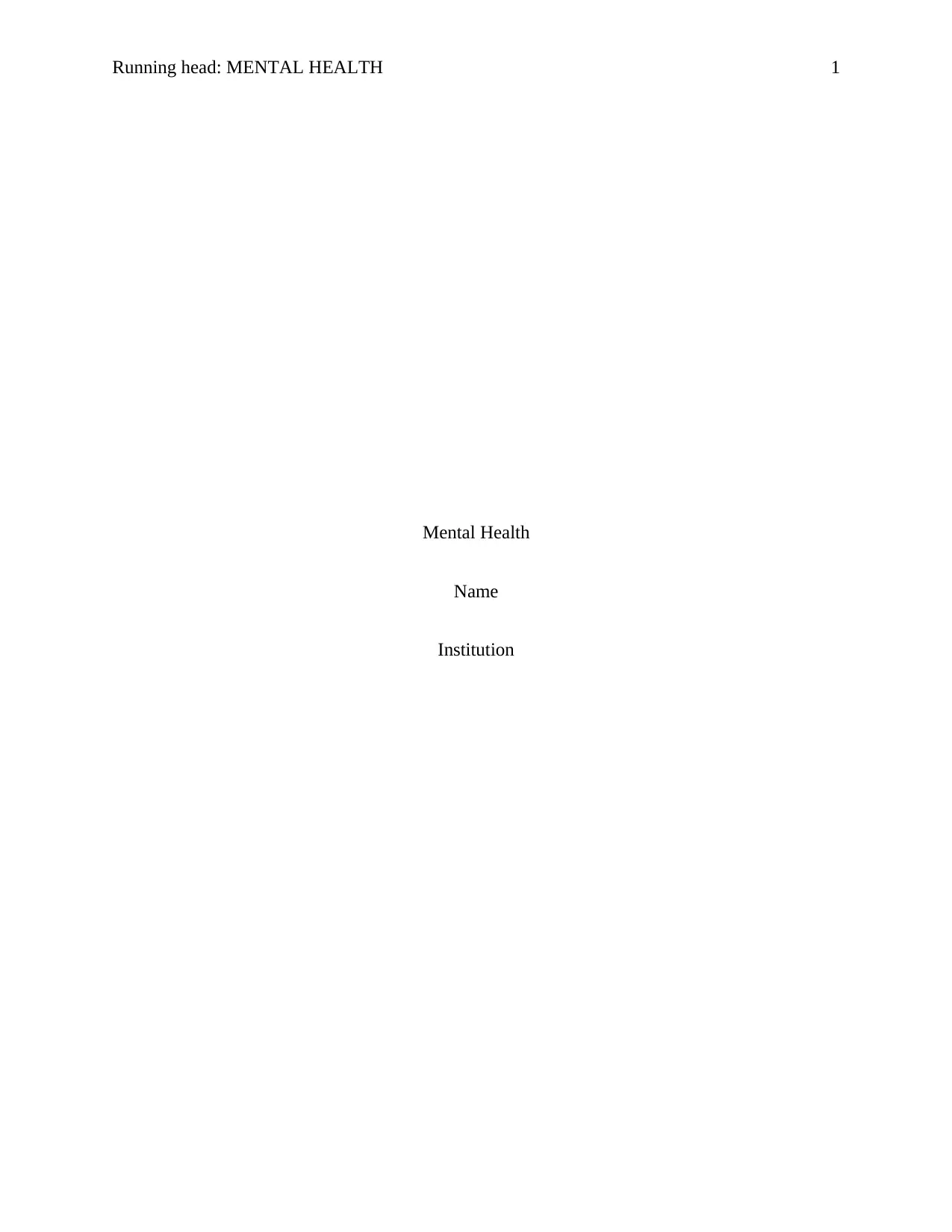
Running head: MENTAL HEALTH 1
Mental Health
Name
Institution
Mental Health
Name
Institution
Paraphrase This Document
Need a fresh take? Get an instant paraphrase of this document with our AI Paraphraser
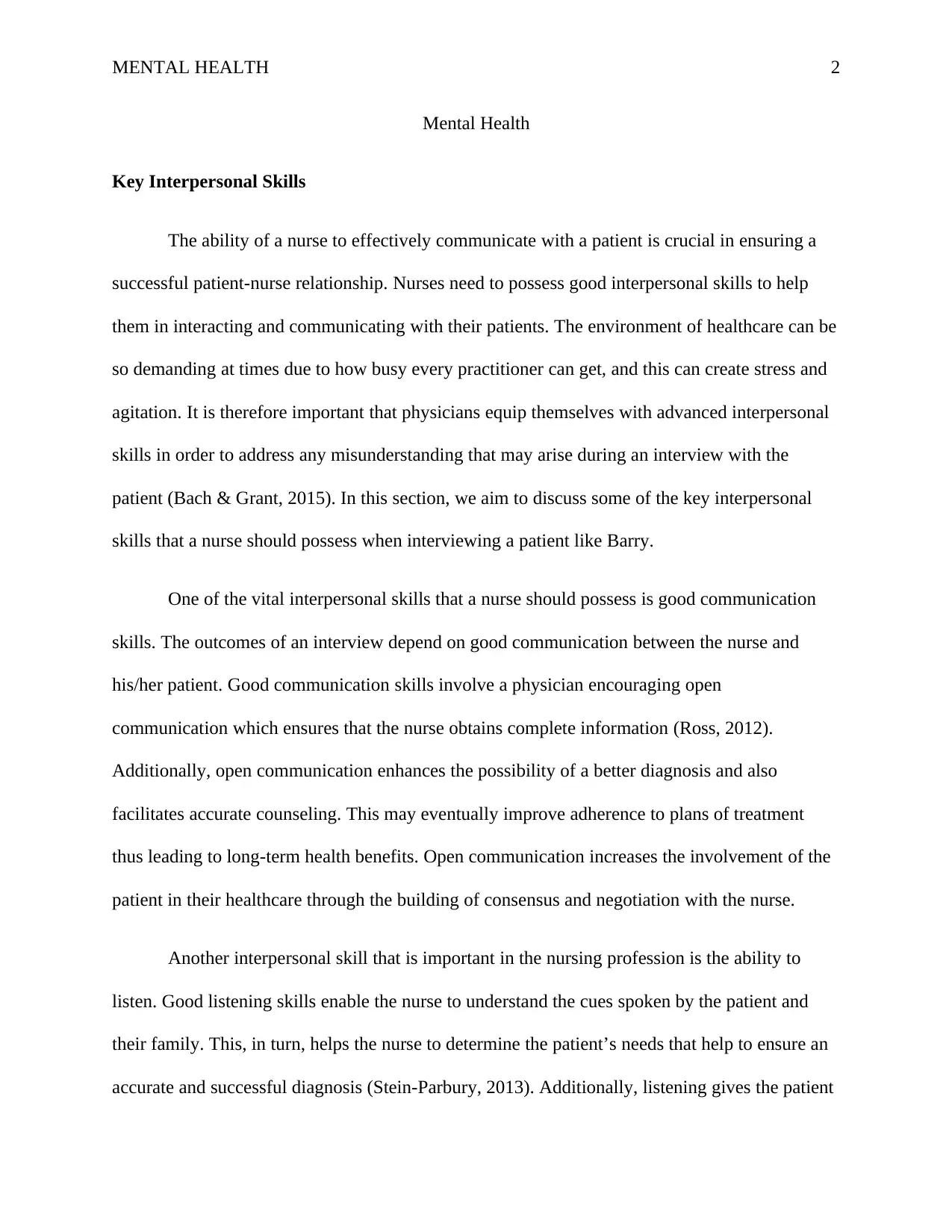
MENTAL HEALTH 2
Mental Health
Key Interpersonal Skills
The ability of a nurse to effectively communicate with a patient is crucial in ensuring a
successful patient-nurse relationship. Nurses need to possess good interpersonal skills to help
them in interacting and communicating with their patients. The environment of healthcare can be
so demanding at times due to how busy every practitioner can get, and this can create stress and
agitation. It is therefore important that physicians equip themselves with advanced interpersonal
skills in order to address any misunderstanding that may arise during an interview with the
patient (Bach & Grant, 2015). In this section, we aim to discuss some of the key interpersonal
skills that a nurse should possess when interviewing a patient like Barry.
One of the vital interpersonal skills that a nurse should possess is good communication
skills. The outcomes of an interview depend on good communication between the nurse and
his/her patient. Good communication skills involve a physician encouraging open
communication which ensures that the nurse obtains complete information (Ross, 2012).
Additionally, open communication enhances the possibility of a better diagnosis and also
facilitates accurate counseling. This may eventually improve adherence to plans of treatment
thus leading to long-term health benefits. Open communication increases the involvement of the
patient in their healthcare through the building of consensus and negotiation with the nurse.
Another interpersonal skill that is important in the nursing profession is the ability to
listen. Good listening skills enable the nurse to understand the cues spoken by the patient and
their family. This, in turn, helps the nurse to determine the patient’s needs that help to ensure an
accurate and successful diagnosis (Stein-Parbury, 2013). Additionally, listening gives the patient
Mental Health
Key Interpersonal Skills
The ability of a nurse to effectively communicate with a patient is crucial in ensuring a
successful patient-nurse relationship. Nurses need to possess good interpersonal skills to help
them in interacting and communicating with their patients. The environment of healthcare can be
so demanding at times due to how busy every practitioner can get, and this can create stress and
agitation. It is therefore important that physicians equip themselves with advanced interpersonal
skills in order to address any misunderstanding that may arise during an interview with the
patient (Bach & Grant, 2015). In this section, we aim to discuss some of the key interpersonal
skills that a nurse should possess when interviewing a patient like Barry.
One of the vital interpersonal skills that a nurse should possess is good communication
skills. The outcomes of an interview depend on good communication between the nurse and
his/her patient. Good communication skills involve a physician encouraging open
communication which ensures that the nurse obtains complete information (Ross, 2012).
Additionally, open communication enhances the possibility of a better diagnosis and also
facilitates accurate counseling. This may eventually improve adherence to plans of treatment
thus leading to long-term health benefits. Open communication increases the involvement of the
patient in their healthcare through the building of consensus and negotiation with the nurse.
Another interpersonal skill that is important in the nursing profession is the ability to
listen. Good listening skills enable the nurse to understand the cues spoken by the patient and
their family. This, in turn, helps the nurse to determine the patient’s needs that help to ensure an
accurate and successful diagnosis (Stein-Parbury, 2013). Additionally, listening gives the patient
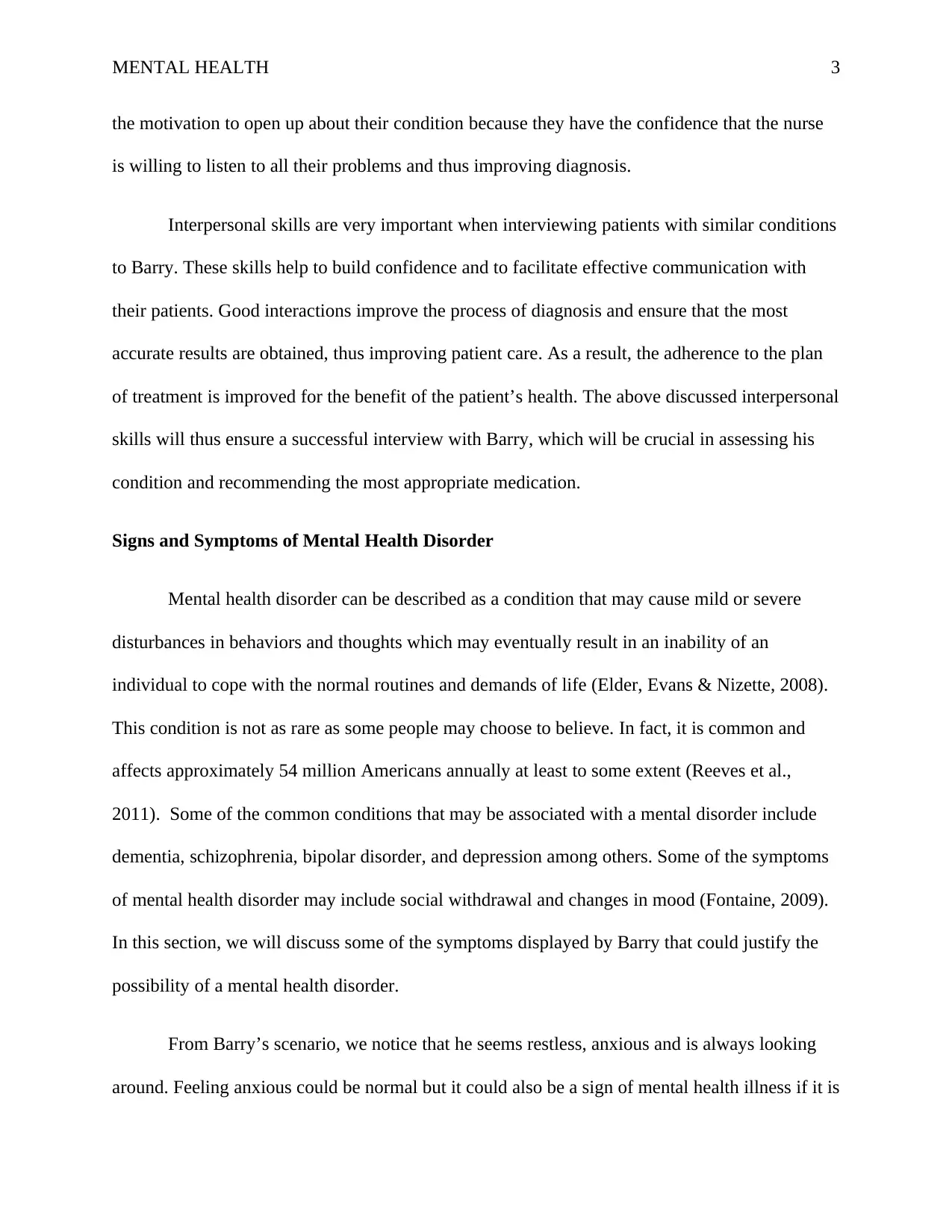
MENTAL HEALTH 3
the motivation to open up about their condition because they have the confidence that the nurse
is willing to listen to all their problems and thus improving diagnosis.
Interpersonal skills are very important when interviewing patients with similar conditions
to Barry. These skills help to build confidence and to facilitate effective communication with
their patients. Good interactions improve the process of diagnosis and ensure that the most
accurate results are obtained, thus improving patient care. As a result, the adherence to the plan
of treatment is improved for the benefit of the patient’s health. The above discussed interpersonal
skills will thus ensure a successful interview with Barry, which will be crucial in assessing his
condition and recommending the most appropriate medication.
Signs and Symptoms of Mental Health Disorder
Mental health disorder can be described as a condition that may cause mild or severe
disturbances in behaviors and thoughts which may eventually result in an inability of an
individual to cope with the normal routines and demands of life (Elder, Evans & Nizette, 2008).
This condition is not as rare as some people may choose to believe. In fact, it is common and
affects approximately 54 million Americans annually at least to some extent (Reeves et al.,
2011). Some of the common conditions that may be associated with a mental disorder include
dementia, schizophrenia, bipolar disorder, and depression among others. Some of the symptoms
of mental health disorder may include social withdrawal and changes in mood (Fontaine, 2009).
In this section, we will discuss some of the symptoms displayed by Barry that could justify the
possibility of a mental health disorder.
From Barry’s scenario, we notice that he seems restless, anxious and is always looking
around. Feeling anxious could be normal but it could also be a sign of mental health illness if it is
the motivation to open up about their condition because they have the confidence that the nurse
is willing to listen to all their problems and thus improving diagnosis.
Interpersonal skills are very important when interviewing patients with similar conditions
to Barry. These skills help to build confidence and to facilitate effective communication with
their patients. Good interactions improve the process of diagnosis and ensure that the most
accurate results are obtained, thus improving patient care. As a result, the adherence to the plan
of treatment is improved for the benefit of the patient’s health. The above discussed interpersonal
skills will thus ensure a successful interview with Barry, which will be crucial in assessing his
condition and recommending the most appropriate medication.
Signs and Symptoms of Mental Health Disorder
Mental health disorder can be described as a condition that may cause mild or severe
disturbances in behaviors and thoughts which may eventually result in an inability of an
individual to cope with the normal routines and demands of life (Elder, Evans & Nizette, 2008).
This condition is not as rare as some people may choose to believe. In fact, it is common and
affects approximately 54 million Americans annually at least to some extent (Reeves et al.,
2011). Some of the common conditions that may be associated with a mental disorder include
dementia, schizophrenia, bipolar disorder, and depression among others. Some of the symptoms
of mental health disorder may include social withdrawal and changes in mood (Fontaine, 2009).
In this section, we will discuss some of the symptoms displayed by Barry that could justify the
possibility of a mental health disorder.
From Barry’s scenario, we notice that he seems restless, anxious and is always looking
around. Feeling anxious could be normal but it could also be a sign of mental health illness if it is
⊘ This is a preview!⊘
Do you want full access?
Subscribe today to unlock all pages.

Trusted by 1+ million students worldwide
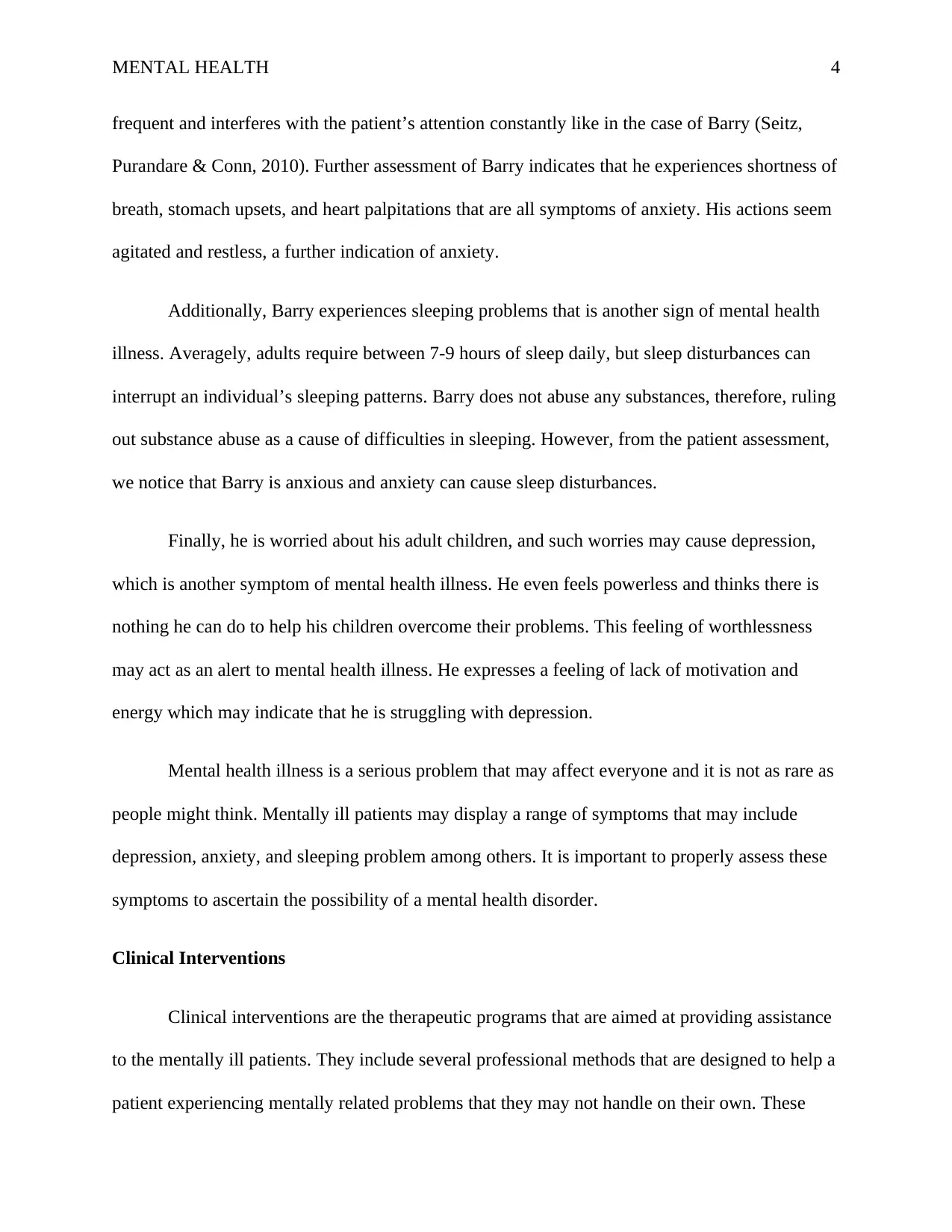
MENTAL HEALTH 4
frequent and interferes with the patient’s attention constantly like in the case of Barry (Seitz,
Purandare & Conn, 2010). Further assessment of Barry indicates that he experiences shortness of
breath, stomach upsets, and heart palpitations that are all symptoms of anxiety. His actions seem
agitated and restless, a further indication of anxiety.
Additionally, Barry experiences sleeping problems that is another sign of mental health
illness. Averagely, adults require between 7-9 hours of sleep daily, but sleep disturbances can
interrupt an individual’s sleeping patterns. Barry does not abuse any substances, therefore, ruling
out substance abuse as a cause of difficulties in sleeping. However, from the patient assessment,
we notice that Barry is anxious and anxiety can cause sleep disturbances.
Finally, he is worried about his adult children, and such worries may cause depression,
which is another symptom of mental health illness. He even feels powerless and thinks there is
nothing he can do to help his children overcome their problems. This feeling of worthlessness
may act as an alert to mental health illness. He expresses a feeling of lack of motivation and
energy which may indicate that he is struggling with depression.
Mental health illness is a serious problem that may affect everyone and it is not as rare as
people might think. Mentally ill patients may display a range of symptoms that may include
depression, anxiety, and sleeping problem among others. It is important to properly assess these
symptoms to ascertain the possibility of a mental health disorder.
Clinical Interventions
Clinical interventions are the therapeutic programs that are aimed at providing assistance
to the mentally ill patients. They include several professional methods that are designed to help a
patient experiencing mentally related problems that they may not handle on their own. These
frequent and interferes with the patient’s attention constantly like in the case of Barry (Seitz,
Purandare & Conn, 2010). Further assessment of Barry indicates that he experiences shortness of
breath, stomach upsets, and heart palpitations that are all symptoms of anxiety. His actions seem
agitated and restless, a further indication of anxiety.
Additionally, Barry experiences sleeping problems that is another sign of mental health
illness. Averagely, adults require between 7-9 hours of sleep daily, but sleep disturbances can
interrupt an individual’s sleeping patterns. Barry does not abuse any substances, therefore, ruling
out substance abuse as a cause of difficulties in sleeping. However, from the patient assessment,
we notice that Barry is anxious and anxiety can cause sleep disturbances.
Finally, he is worried about his adult children, and such worries may cause depression,
which is another symptom of mental health illness. He even feels powerless and thinks there is
nothing he can do to help his children overcome their problems. This feeling of worthlessness
may act as an alert to mental health illness. He expresses a feeling of lack of motivation and
energy which may indicate that he is struggling with depression.
Mental health illness is a serious problem that may affect everyone and it is not as rare as
people might think. Mentally ill patients may display a range of symptoms that may include
depression, anxiety, and sleeping problem among others. It is important to properly assess these
symptoms to ascertain the possibility of a mental health disorder.
Clinical Interventions
Clinical interventions are the therapeutic programs that are aimed at providing assistance
to the mentally ill patients. They include several professional methods that are designed to help a
patient experiencing mentally related problems that they may not handle on their own. These
Paraphrase This Document
Need a fresh take? Get an instant paraphrase of this document with our AI Paraphraser
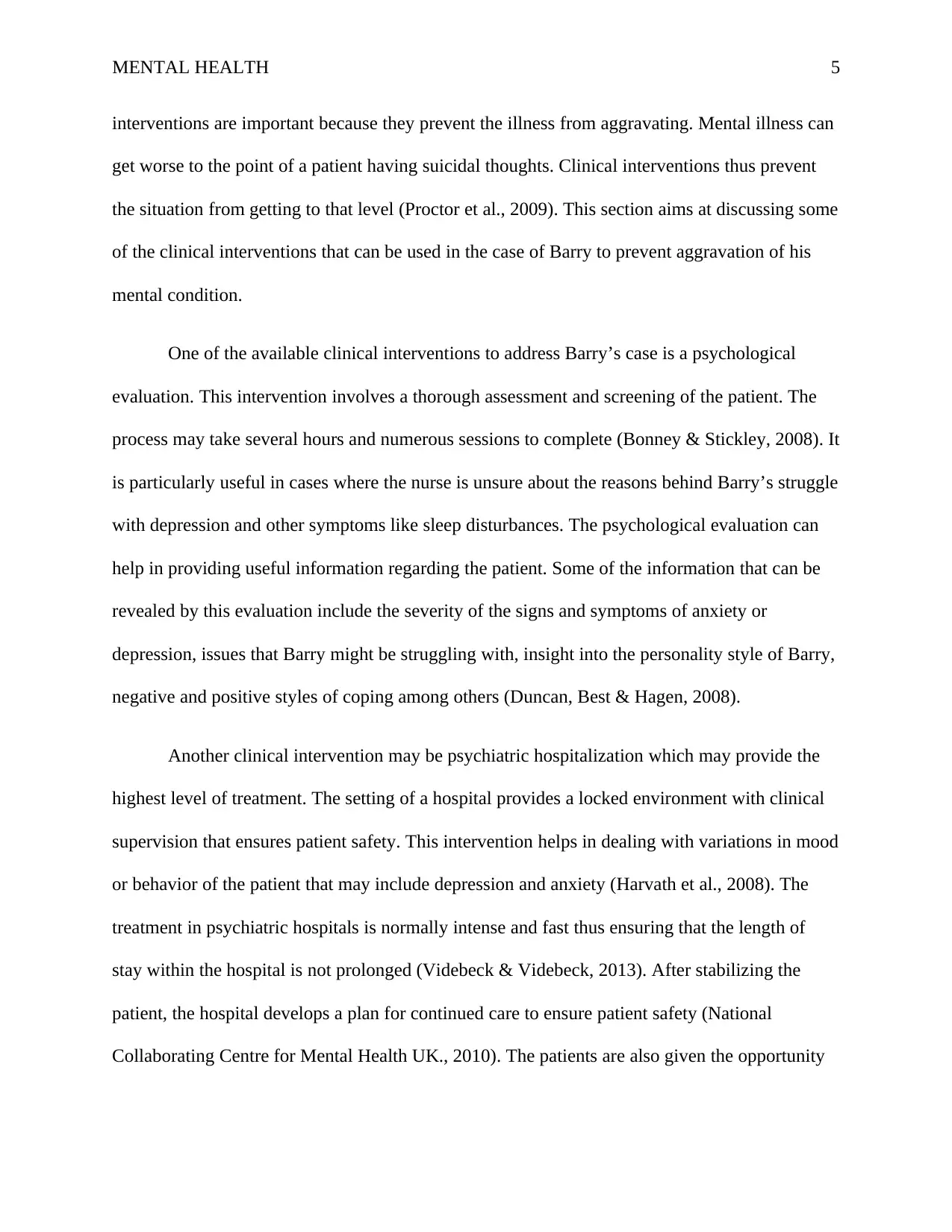
MENTAL HEALTH 5
interventions are important because they prevent the illness from aggravating. Mental illness can
get worse to the point of a patient having suicidal thoughts. Clinical interventions thus prevent
the situation from getting to that level (Proctor et al., 2009). This section aims at discussing some
of the clinical interventions that can be used in the case of Barry to prevent aggravation of his
mental condition.
One of the available clinical interventions to address Barry’s case is a psychological
evaluation. This intervention involves a thorough assessment and screening of the patient. The
process may take several hours and numerous sessions to complete (Bonney & Stickley, 2008). It
is particularly useful in cases where the nurse is unsure about the reasons behind Barry’s struggle
with depression and other symptoms like sleep disturbances. The psychological evaluation can
help in providing useful information regarding the patient. Some of the information that can be
revealed by this evaluation include the severity of the signs and symptoms of anxiety or
depression, issues that Barry might be struggling with, insight into the personality style of Barry,
negative and positive styles of coping among others (Duncan, Best & Hagen, 2008).
Another clinical intervention may be psychiatric hospitalization which may provide the
highest level of treatment. The setting of a hospital provides a locked environment with clinical
supervision that ensures patient safety. This intervention helps in dealing with variations in mood
or behavior of the patient that may include depression and anxiety (Harvath et al., 2008). The
treatment in psychiatric hospitals is normally intense and fast thus ensuring that the length of
stay within the hospital is not prolonged (Videbeck & Videbeck, 2013). After stabilizing the
patient, the hospital develops a plan for continued care to ensure patient safety (National
Collaborating Centre for Mental Health UK., 2010). The patients are also given the opportunity
interventions are important because they prevent the illness from aggravating. Mental illness can
get worse to the point of a patient having suicidal thoughts. Clinical interventions thus prevent
the situation from getting to that level (Proctor et al., 2009). This section aims at discussing some
of the clinical interventions that can be used in the case of Barry to prevent aggravation of his
mental condition.
One of the available clinical interventions to address Barry’s case is a psychological
evaluation. This intervention involves a thorough assessment and screening of the patient. The
process may take several hours and numerous sessions to complete (Bonney & Stickley, 2008). It
is particularly useful in cases where the nurse is unsure about the reasons behind Barry’s struggle
with depression and other symptoms like sleep disturbances. The psychological evaluation can
help in providing useful information regarding the patient. Some of the information that can be
revealed by this evaluation include the severity of the signs and symptoms of anxiety or
depression, issues that Barry might be struggling with, insight into the personality style of Barry,
negative and positive styles of coping among others (Duncan, Best & Hagen, 2008).
Another clinical intervention may be psychiatric hospitalization which may provide the
highest level of treatment. The setting of a hospital provides a locked environment with clinical
supervision that ensures patient safety. This intervention helps in dealing with variations in mood
or behavior of the patient that may include depression and anxiety (Harvath et al., 2008). The
treatment in psychiatric hospitals is normally intense and fast thus ensuring that the length of
stay within the hospital is not prolonged (Videbeck & Videbeck, 2013). After stabilizing the
patient, the hospital develops a plan for continued care to ensure patient safety (National
Collaborating Centre for Mental Health UK., 2010). The patients are also given the opportunity
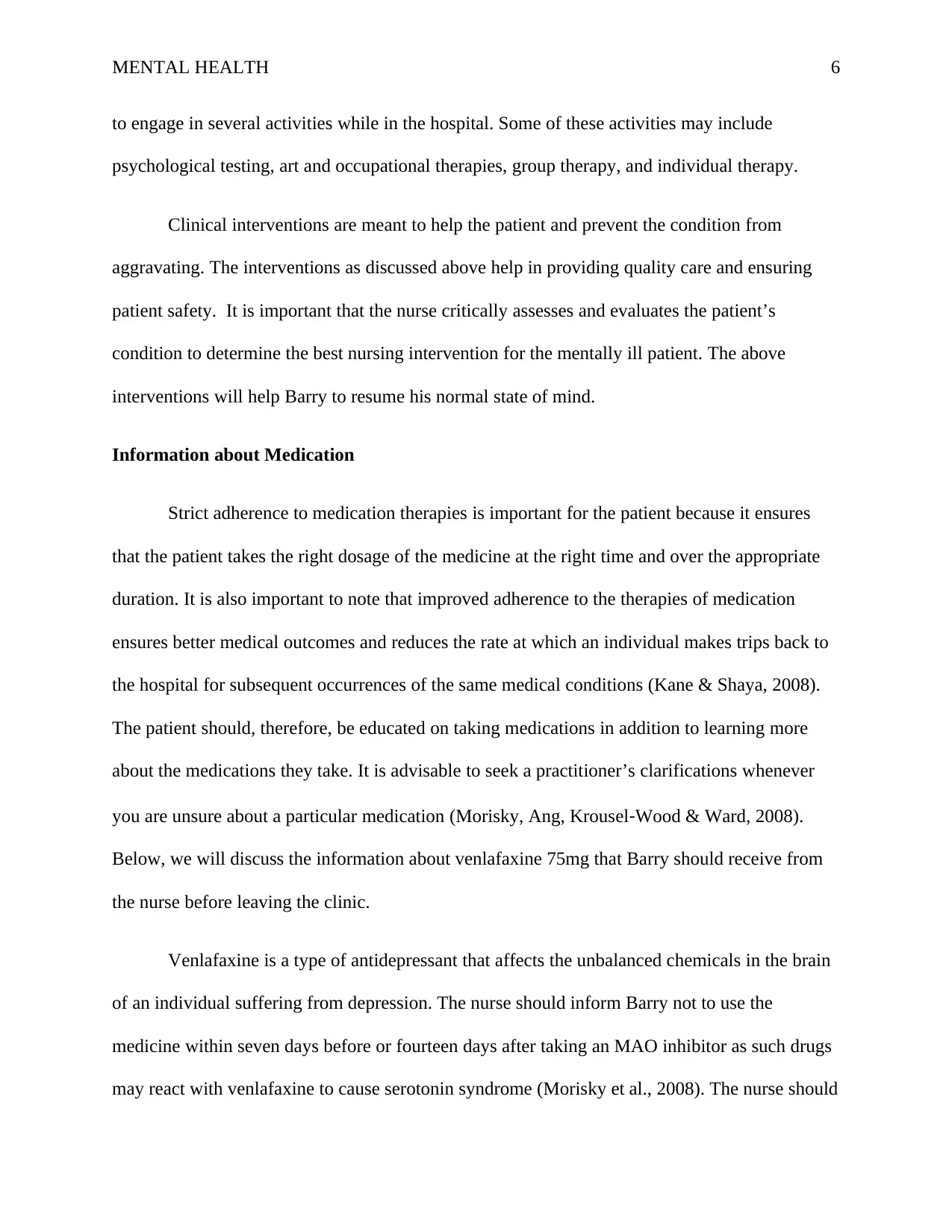
MENTAL HEALTH 6
to engage in several activities while in the hospital. Some of these activities may include
psychological testing, art and occupational therapies, group therapy, and individual therapy.
Clinical interventions are meant to help the patient and prevent the condition from
aggravating. The interventions as discussed above help in providing quality care and ensuring
patient safety. It is important that the nurse critically assesses and evaluates the patient’s
condition to determine the best nursing intervention for the mentally ill patient. The above
interventions will help Barry to resume his normal state of mind.
Information about Medication
Strict adherence to medication therapies is important for the patient because it ensures
that the patient takes the right dosage of the medicine at the right time and over the appropriate
duration. It is also important to note that improved adherence to the therapies of medication
ensures better medical outcomes and reduces the rate at which an individual makes trips back to
the hospital for subsequent occurrences of the same medical conditions (Kane & Shaya, 2008).
The patient should, therefore, be educated on taking medications in addition to learning more
about the medications they take. It is advisable to seek a practitioner’s clarifications whenever
you are unsure about a particular medication (Morisky, Ang, Krousel‐Wood & Ward, 2008).
Below, we will discuss the information about venlafaxine 75mg that Barry should receive from
the nurse before leaving the clinic.
Venlafaxine is a type of antidepressant that affects the unbalanced chemicals in the brain
of an individual suffering from depression. The nurse should inform Barry not to use the
medicine within seven days before or fourteen days after taking an MAO inhibitor as such drugs
may react with venlafaxine to cause serotonin syndrome (Morisky et al., 2008). The nurse should
to engage in several activities while in the hospital. Some of these activities may include
psychological testing, art and occupational therapies, group therapy, and individual therapy.
Clinical interventions are meant to help the patient and prevent the condition from
aggravating. The interventions as discussed above help in providing quality care and ensuring
patient safety. It is important that the nurse critically assesses and evaluates the patient’s
condition to determine the best nursing intervention for the mentally ill patient. The above
interventions will help Barry to resume his normal state of mind.
Information about Medication
Strict adherence to medication therapies is important for the patient because it ensures
that the patient takes the right dosage of the medicine at the right time and over the appropriate
duration. It is also important to note that improved adherence to the therapies of medication
ensures better medical outcomes and reduces the rate at which an individual makes trips back to
the hospital for subsequent occurrences of the same medical conditions (Kane & Shaya, 2008).
The patient should, therefore, be educated on taking medications in addition to learning more
about the medications they take. It is advisable to seek a practitioner’s clarifications whenever
you are unsure about a particular medication (Morisky, Ang, Krousel‐Wood & Ward, 2008).
Below, we will discuss the information about venlafaxine 75mg that Barry should receive from
the nurse before leaving the clinic.
Venlafaxine is a type of antidepressant that affects the unbalanced chemicals in the brain
of an individual suffering from depression. The nurse should inform Barry not to use the
medicine within seven days before or fourteen days after taking an MAO inhibitor as such drugs
may react with venlafaxine to cause serotonin syndrome (Morisky et al., 2008). The nurse should
⊘ This is a preview!⊘
Do you want full access?
Subscribe today to unlock all pages.

Trusted by 1+ million students worldwide
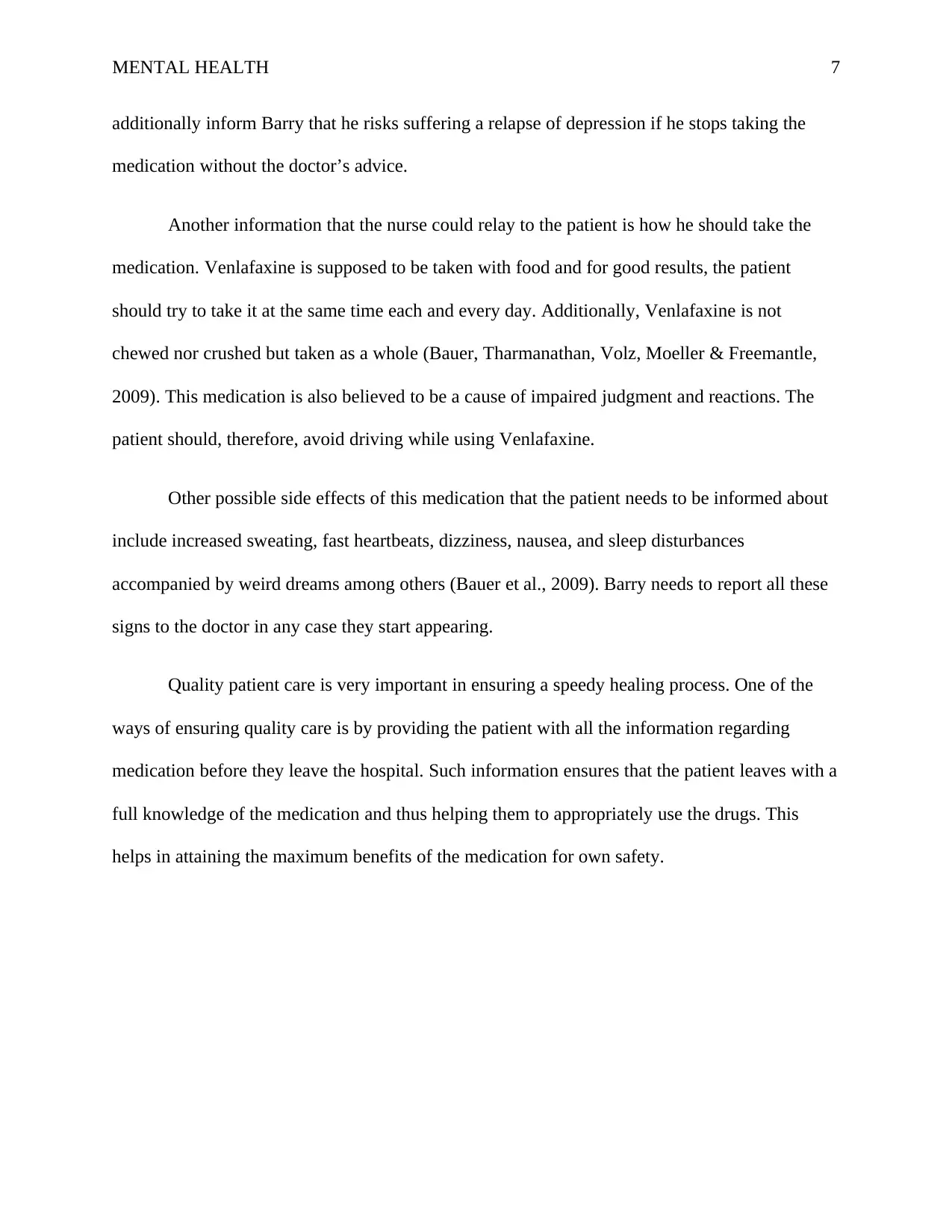
MENTAL HEALTH 7
additionally inform Barry that he risks suffering a relapse of depression if he stops taking the
medication without the doctor’s advice.
Another information that the nurse could relay to the patient is how he should take the
medication. Venlafaxine is supposed to be taken with food and for good results, the patient
should try to take it at the same time each and every day. Additionally, Venlafaxine is not
chewed nor crushed but taken as a whole (Bauer, Tharmanathan, Volz, Moeller & Freemantle,
2009). This medication is also believed to be a cause of impaired judgment and reactions. The
patient should, therefore, avoid driving while using Venlafaxine.
Other possible side effects of this medication that the patient needs to be informed about
include increased sweating, fast heartbeats, dizziness, nausea, and sleep disturbances
accompanied by weird dreams among others (Bauer et al., 2009). Barry needs to report all these
signs to the doctor in any case they start appearing.
Quality patient care is very important in ensuring a speedy healing process. One of the
ways of ensuring quality care is by providing the patient with all the information regarding
medication before they leave the hospital. Such information ensures that the patient leaves with a
full knowledge of the medication and thus helping them to appropriately use the drugs. This
helps in attaining the maximum benefits of the medication for own safety.
additionally inform Barry that he risks suffering a relapse of depression if he stops taking the
medication without the doctor’s advice.
Another information that the nurse could relay to the patient is how he should take the
medication. Venlafaxine is supposed to be taken with food and for good results, the patient
should try to take it at the same time each and every day. Additionally, Venlafaxine is not
chewed nor crushed but taken as a whole (Bauer, Tharmanathan, Volz, Moeller & Freemantle,
2009). This medication is also believed to be a cause of impaired judgment and reactions. The
patient should, therefore, avoid driving while using Venlafaxine.
Other possible side effects of this medication that the patient needs to be informed about
include increased sweating, fast heartbeats, dizziness, nausea, and sleep disturbances
accompanied by weird dreams among others (Bauer et al., 2009). Barry needs to report all these
signs to the doctor in any case they start appearing.
Quality patient care is very important in ensuring a speedy healing process. One of the
ways of ensuring quality care is by providing the patient with all the information regarding
medication before they leave the hospital. Such information ensures that the patient leaves with a
full knowledge of the medication and thus helping them to appropriately use the drugs. This
helps in attaining the maximum benefits of the medication for own safety.
Paraphrase This Document
Need a fresh take? Get an instant paraphrase of this document with our AI Paraphraser
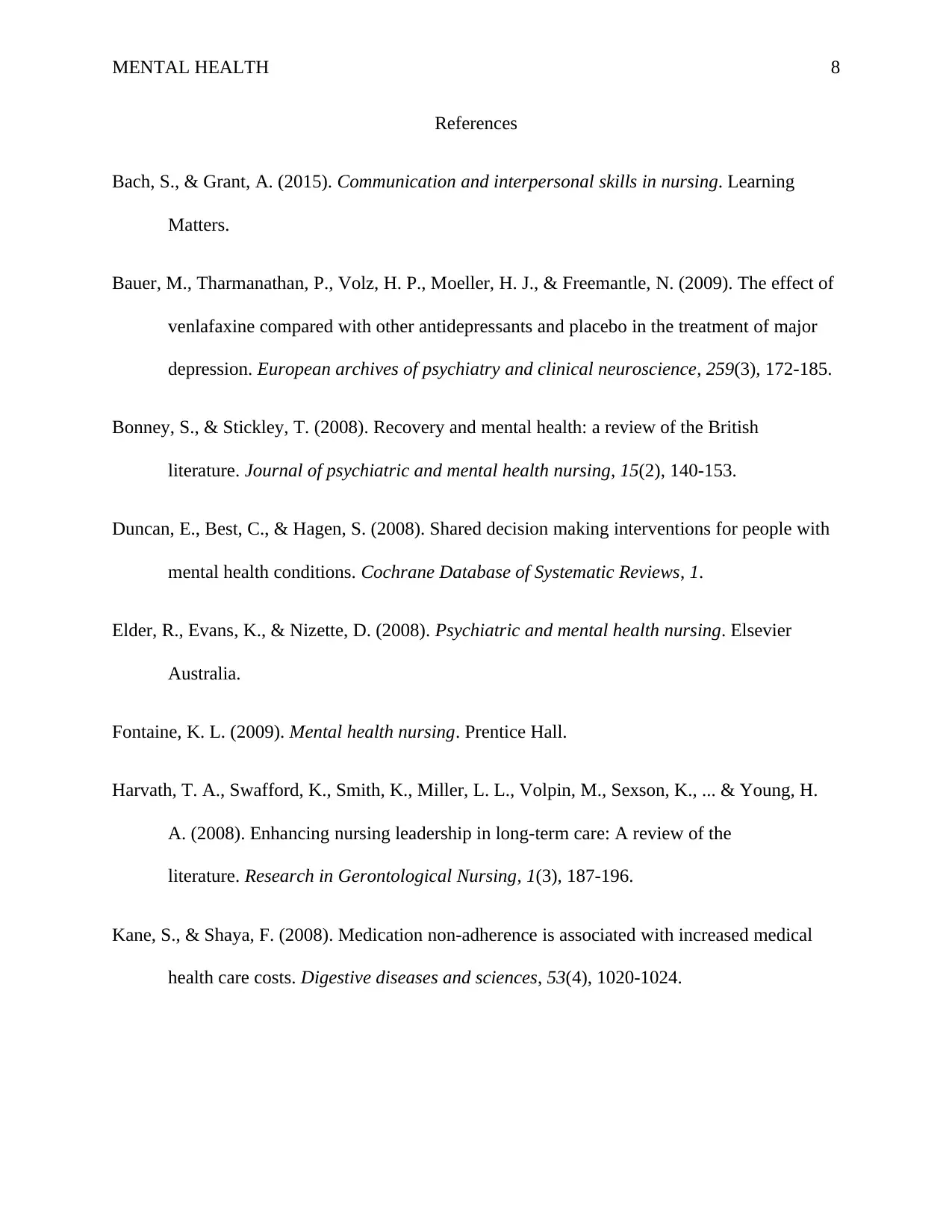
MENTAL HEALTH 8
References
Bach, S., & Grant, A. (2015). Communication and interpersonal skills in nursing. Learning
Matters.
Bauer, M., Tharmanathan, P., Volz, H. P., Moeller, H. J., & Freemantle, N. (2009). The effect of
venlafaxine compared with other antidepressants and placebo in the treatment of major
depression. European archives of psychiatry and clinical neuroscience, 259(3), 172-185.
Bonney, S., & Stickley, T. (2008). Recovery and mental health: a review of the British
literature. Journal of psychiatric and mental health nursing, 15(2), 140-153.
Duncan, E., Best, C., & Hagen, S. (2008). Shared decision making interventions for people with
mental health conditions. Cochrane Database of Systematic Reviews, 1.
Elder, R., Evans, K., & Nizette, D. (2008). Psychiatric and mental health nursing. Elsevier
Australia.
Fontaine, K. L. (2009). Mental health nursing. Prentice Hall.
Harvath, T. A., Swafford, K., Smith, K., Miller, L. L., Volpin, M., Sexson, K., ... & Young, H.
A. (2008). Enhancing nursing leadership in long-term care: A review of the
literature. Research in Gerontological Nursing, 1(3), 187-196.
Kane, S., & Shaya, F. (2008). Medication non-adherence is associated with increased medical
health care costs. Digestive diseases and sciences, 53(4), 1020-1024.
References
Bach, S., & Grant, A. (2015). Communication and interpersonal skills in nursing. Learning
Matters.
Bauer, M., Tharmanathan, P., Volz, H. P., Moeller, H. J., & Freemantle, N. (2009). The effect of
venlafaxine compared with other antidepressants and placebo in the treatment of major
depression. European archives of psychiatry and clinical neuroscience, 259(3), 172-185.
Bonney, S., & Stickley, T. (2008). Recovery and mental health: a review of the British
literature. Journal of psychiatric and mental health nursing, 15(2), 140-153.
Duncan, E., Best, C., & Hagen, S. (2008). Shared decision making interventions for people with
mental health conditions. Cochrane Database of Systematic Reviews, 1.
Elder, R., Evans, K., & Nizette, D. (2008). Psychiatric and mental health nursing. Elsevier
Australia.
Fontaine, K. L. (2009). Mental health nursing. Prentice Hall.
Harvath, T. A., Swafford, K., Smith, K., Miller, L. L., Volpin, M., Sexson, K., ... & Young, H.
A. (2008). Enhancing nursing leadership in long-term care: A review of the
literature. Research in Gerontological Nursing, 1(3), 187-196.
Kane, S., & Shaya, F. (2008). Medication non-adherence is associated with increased medical
health care costs. Digestive diseases and sciences, 53(4), 1020-1024.
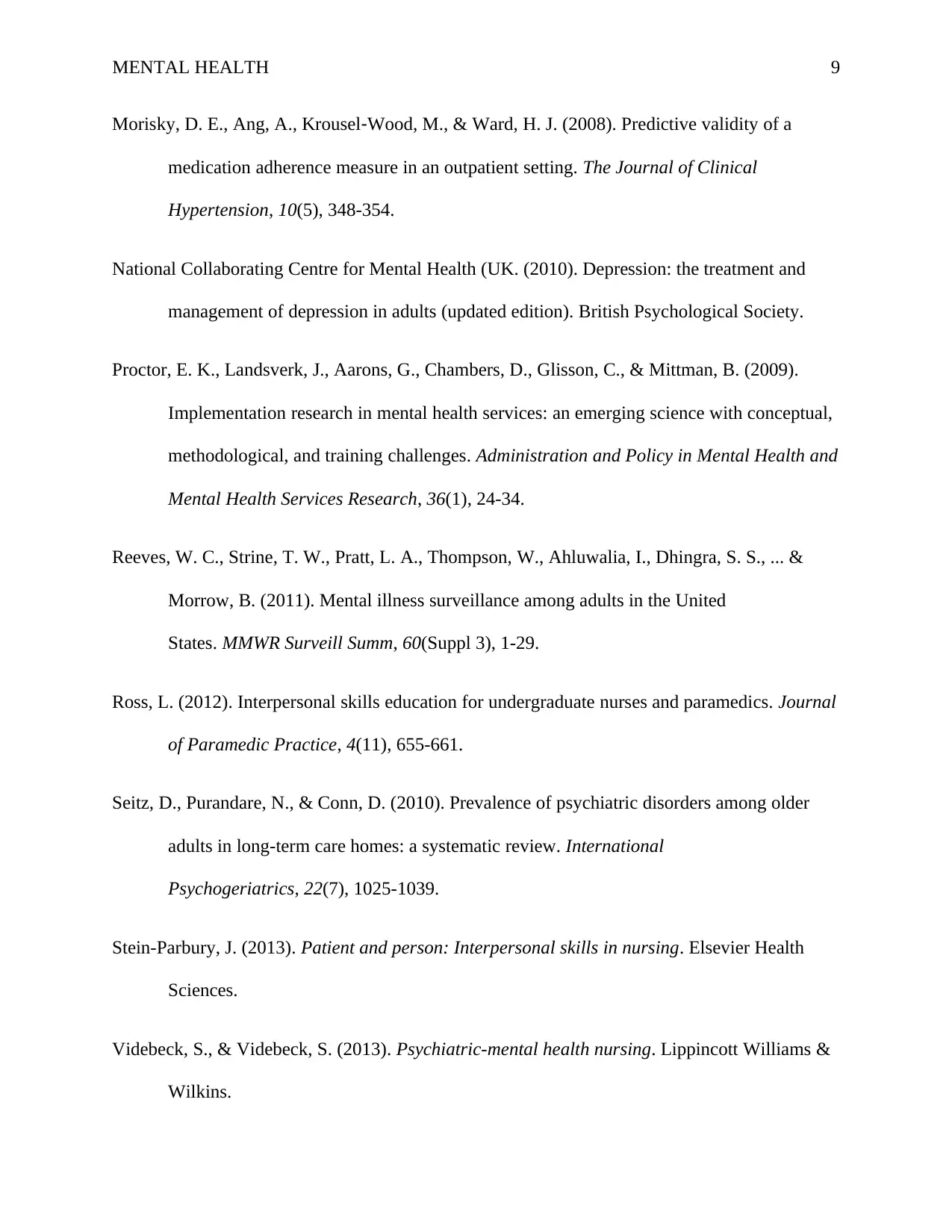
MENTAL HEALTH 9
Morisky, D. E., Ang, A., Krousel‐Wood, M., & Ward, H. J. (2008). Predictive validity of a
medication adherence measure in an outpatient setting. The Journal of Clinical
Hypertension, 10(5), 348-354.
National Collaborating Centre for Mental Health (UK. (2010). Depression: the treatment and
management of depression in adults (updated edition). British Psychological Society.
Proctor, E. K., Landsverk, J., Aarons, G., Chambers, D., Glisson, C., & Mittman, B. (2009).
Implementation research in mental health services: an emerging science with conceptual,
methodological, and training challenges. Administration and Policy in Mental Health and
Mental Health Services Research, 36(1), 24-34.
Reeves, W. C., Strine, T. W., Pratt, L. A., Thompson, W., Ahluwalia, I., Dhingra, S. S., ... &
Morrow, B. (2011). Mental illness surveillance among adults in the United
States. MMWR Surveill Summ, 60(Suppl 3), 1-29.
Ross, L. (2012). Interpersonal skills education for undergraduate nurses and paramedics. Journal
of Paramedic Practice, 4(11), 655-661.
Seitz, D., Purandare, N., & Conn, D. (2010). Prevalence of psychiatric disorders among older
adults in long-term care homes: a systematic review. International
Psychogeriatrics, 22(7), 1025-1039.
Stein-Parbury, J. (2013). Patient and person: Interpersonal skills in nursing. Elsevier Health
Sciences.
Videbeck, S., & Videbeck, S. (2013). Psychiatric-mental health nursing. Lippincott Williams &
Wilkins.
Morisky, D. E., Ang, A., Krousel‐Wood, M., & Ward, H. J. (2008). Predictive validity of a
medication adherence measure in an outpatient setting. The Journal of Clinical
Hypertension, 10(5), 348-354.
National Collaborating Centre for Mental Health (UK. (2010). Depression: the treatment and
management of depression in adults (updated edition). British Psychological Society.
Proctor, E. K., Landsverk, J., Aarons, G., Chambers, D., Glisson, C., & Mittman, B. (2009).
Implementation research in mental health services: an emerging science with conceptual,
methodological, and training challenges. Administration and Policy in Mental Health and
Mental Health Services Research, 36(1), 24-34.
Reeves, W. C., Strine, T. W., Pratt, L. A., Thompson, W., Ahluwalia, I., Dhingra, S. S., ... &
Morrow, B. (2011). Mental illness surveillance among adults in the United
States. MMWR Surveill Summ, 60(Suppl 3), 1-29.
Ross, L. (2012). Interpersonal skills education for undergraduate nurses and paramedics. Journal
of Paramedic Practice, 4(11), 655-661.
Seitz, D., Purandare, N., & Conn, D. (2010). Prevalence of psychiatric disorders among older
adults in long-term care homes: a systematic review. International
Psychogeriatrics, 22(7), 1025-1039.
Stein-Parbury, J. (2013). Patient and person: Interpersonal skills in nursing. Elsevier Health
Sciences.
Videbeck, S., & Videbeck, S. (2013). Psychiatric-mental health nursing. Lippincott Williams &
Wilkins.
⊘ This is a preview!⊘
Do you want full access?
Subscribe today to unlock all pages.

Trusted by 1+ million students worldwide

MENTAL HEALTH 10
1 out of 10
Related Documents
Your All-in-One AI-Powered Toolkit for Academic Success.
+13062052269
info@desklib.com
Available 24*7 on WhatsApp / Email
![[object Object]](/_next/static/media/star-bottom.7253800d.svg)
Unlock your academic potential
Copyright © 2020–2026 A2Z Services. All Rights Reserved. Developed and managed by ZUCOL.





